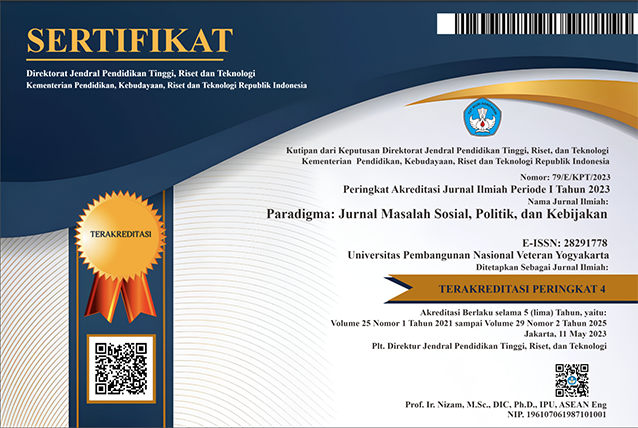LATAR BELAKANG PEMBOIKOTAN PRODUK HIBURAN KOREA SELATAN OLEH CINA TAHUN 2016
DOI:
https://doi.org/10.31315/paradigma.v26i2.7289Keywords:
hubungan internasionalAbstract
Hallyu merupakan istilah yang digunakan untuk menggambarkan kecintaan terhadap budaya Korea Selatan dan produknya di mata Internasional. Hallyu berkembang dengan cepat ke seluruh dunia terutama Asia, termaksud Cina. Hubungan bilateral yang terjalin diantara kedua negara semakin mempermudah produk hiburan Korea Selatan mulai dari K-pop (Korean Pop Musik), Drama Korea, Film Korea, Album Musik Korea memasuki pasar hiburan Cina. Banyaknya produk hiburan Korea Selatan yang masuk ke Cina membuat Cina menjadi pasar luar negeri kedua terbesar setelah Jepang bagi produk tersebut. Menariknya, pada Agustus 2016 Pemerintah Cina melarang atau memboikot berlangsungnya salah satu konser bintang K-pop (Korean Pop), yaitu EXO yang kemudian diikuti dengan dikeluarkannya peraturan tidak tertulis yang ditujukan untuk stasiun televisi Cina agar tidak menayangkan produk hiburan yang berkaitan dengan Korea Selatan pada November 2016. Berdasarkan hasil analisa dengan menggunakan metode penelitian kulitatif dan trade-peace model sebagai kerangka teori diperoleh tiga alasan yang melatarbelakangi pemboikotan produk hiburan Korea Selatan oleh Cina pada tahun 2016 yaitu, untuk melindungi produk hiburan dalam negeri Cina, adanya pesan atau pengaruh implisit dalam Drama Korea Selatan, serta sebagai upaya balasan terkait THAAD (Terminal High Altitude di Area Defense) Korea Selatan.References
Benson, Brett V dan Emerson M.S. Niou. (2007). Economic Interdependence and Peace: A Game-Theoretic Analysis, Jurnal of East Asian Studies. 7. 35-59.
Bok-rae,Kim. (2015). Past, Present, Future of Hallyu (Korean Wave).American International Journal of Contmporary Reaserch. 5(5).159.
Denney, Steven. (2015). South Korea’s Economic Dependence on China. Diakses dari http://thediplomat.com/2015/09/south-koreas-economic-dependence-on-china/.
Indra, Rahman. (2016). Pelarangan Drama Korea di China Mulai Berdampak. Diakses darihttps://www.cnnindonesia.com/hiburan/20161123154153220174776/pelaran gan-drama-korea-di-china-mulai-berdampak.
Jang, Soo Hyun. (2012). The Korean Wave and Its Implications for the Korea - Cina Relationship. Jurnal of Internasional and Area Studies. 19(2). 98.
Jungah, Ahn. (2014). Gelombang Korea Baru di Cina: Penggunaan Pengguna Cina atas Culture Populer Korea melalui Internet. International Journal of Contents. 10(3). 48.
Kim, Jieun. (2010). Korean Wave in Cina : Its Impact On The South Korean - Chinese Relations. Thesis The Faculty of Graduate Studies The University of British Columbia. 3
Korea Film Council. (2013) The Current State of Chinese Film Industry and Korea-Cina Joint Production (Junggugui Yeonghwasaneop Hyeonhwanggwa Hanjung Gongdongjejak), Korea Film Council Report. 3.
Lee, Sue Jin. (2011), “The Hallyu: the Seoul of Asia”. The Elon of Undergraduate Reseach in Communication. 2 (1). 86. Diakses dari http://www.elon.edu/docs/e- web/.
Matthew. Economic Effect of Korean Wave Underwhelming for Past 15 Years. Diakses dari http://www.businesskorea.co.kr/news/articleView.html?idxno=5623.
OEC World. China. Diakses dari https://oec.world/en/profile/country/chn/#Exports19/03/2020.
Putera, Hadi Purnama. (2017). Pelarangan Import Drama Republik Korea oleh Republik Rakyat Tiongkok dalam Perspektif National Interest dan Hubungan Internasional. Jurnal Komunikasi Hukum Universitas Pendidikan Ganesha Singaraja. 3(2). 35
Putri, Aditya Widya. (2016). Cina Memboikot K-Pop Gara-Gara Urusan Nuklir. Diakses dari https://tirto.id/cina-memboikot-k-pop-gara-gara-urusan-nuklir-b5Wv.
PRC Ministry of Foreign Affairs. Wang Yi Talks About US’s Plan to Deploy THAAD Missile Defense System in ROK. Diakses dari http://www.fmprc.gov.cn/mfa_eng/zxxx_662805/t1340525.shtml.
Qonita, Maulida Ibnaty. (2019). Analisis Perubahan Kebijakan Luar Negeri Korea Selatan Dalam Pemasangan Sistem Terminal High Altitude Area Defense (THAAD). Journal of International Relations.5(4). 797-806.
Revina, Mark. (2009). Introduction: Conceptualizing The Hallyu Southeast, Review of Asian Studies. 31. 3-9.
The Heritage Foundation. (2019). South Korea. 2019 Index of Economic Freedom Report.
The Straitstimes. (2016). Chinese government warns of dangers of Korean dramas as Descendants Of The Sun hits 440m views in China. Diakses dari https://www.straitstimes.com/lifestyle/entertainment/koreangovernment-warns- of-dangers-of-korean-dramas-as-descendants-of-the
Yaoti, Ren. (2016). Chinese fans of S.Korean pop culture stay loyal despite rumored ban.
Diakses dari https://www.globaltimes.cn/content/1001068.shtml.
Downloads
Published
How to Cite
Issue
Section
License
The manuscript submitted to Paradigma: Jurnal Masalah Sosial, Politik, dan Kebijakan journals are released under the license of Creative Commons Attribution-Non Commercial- ShareAlike (CC BY SA) if and when the article is accepted for publication.
We declare that:
- This paper has not been published in the same form elsewhere.
- It will not be submitted anywhere else for publication prior to acceptance/rejection by this Journal.
- A copyright permission is obtained for materials published elsewhere and which require this permission for reproduction.
Retained Rights/Terms and Conditions
Authors retain all proprietary rights to the published works, such as (but not limited to) the following rights:
- Copyright and other proprietary rights relating to the article, such as patent rights,
- The right to use the substance of the article in own future works, including lectures and books,
- The right to reproduce the article for own purposes,
- The right to self-archive the article
The right to enter into separate, additional contractual arrangements for the non-exclusive distribution of the article's published version (e.g., post it to an institutional repository or publish it in a book), with an acknowledgment of its initial publication in this journal Paradigma: Jurnal Masalah Sosial, Politik, dan Kebijakan



